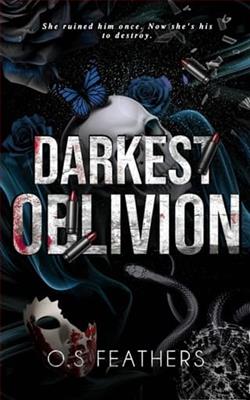Page 12 of Captive Virgin of the Bratva
He rises with me. “You’re stronger than anyone I know.”
“Don’t let the kids hear that. They’ll never listen to me again.”
William chuckles and follows me to the door. “Be careful tonight.”
“I always am.”
His eyes soften. “No, you’re always brave. That’s not the same thing.”
We linger for a moment longer by the office threshold. His hand rests briefly on my shoulder—steadying, grounding. The way it used to when I was too angry, too scared, too lost to speak.
“I’m proud of you, Elise,” he says.
“I know,” I whisper.
I do, but hearing it still matters.
I step into the hallway, the sounds of the orphanage rising around me again—footsteps, laughter, the echo of someone calling out for snack time. Life carrying on.
As I leave the building, I glance back once at the front steps. William’s silhouette stands framed in the office window, watching me go.
He lifts a hand. I raise mine in return.
***
The sun is already sinking behind the rooftops by the time I step out of my apartment. The street is bathed in that strange, in-between light—dusky gold smeared over cracked pavement and rusted balconies, the sky bruising purple at the edges. I clutch my thermos tighter, still half full from earlier, and let the door swing shut behind me.
Tonight feels heavier than usual. The air presses low, damp with that vague, metallic scent that comes right before rain. I tug my scarf higher around my neck and start walking, boots echoing quietly along the sidewalk. The hospital isn’t far—eight blocks exactly. I’ve walked it more times than I can count.
Normally, I find comfort in the rhythm. The steady route. The quiet before stepping into chaos. But tonight, something itches under my skin. Not fear. Not exactly. Just a flicker. Like I’ve forgotten something important. Like I’m walking toward a door I won’t be the same after crossing.
I shake it off.
The last few hours at the orphanage keep tugging at my thoughts. William’s call. The look in his eyes when he came back into the room. It wasn’t just a donor call. It wasn’t a scheduling mishap. Something was wrong.
And he didn’t tell me.
It’s not your business anymore,I remind myself.You’re not a kid there. You’re not his responsibility—and he’s not yours.
Still.
I pass the corner bodega. The clerk nods through the window as he sweeps up a shattered jar of pickles. A bus hisses past, headlights glaring before it turns off onto a side street. I cross at the light, the hospital now in view across the lot—its windows lit like a grid of tired eyes, yellow and flickering, each one hiding a story I’ll be pulled into soon enough.
I check my phone as I walk, scanning for new messages.
Nothing. Just Maya’s text from earlier.
Don’t forget snacks tomorrow, and the good wine.
I smile faintly and type a quick reply—Too late. Long live the snack queen—but I don’t hit send. The screen’s still lit when I slip the phone back into my coat pocket.
As I enter the staff lot, the sharp scent of exhaust and damp concrete hits me. The lamplight overhead flickers once. Then again. I make a note to mention it to security. Another thing no one will fix unless it breaks completely.
I’m mid-scroll, checking the hospital’s internal message board, when my shoulder twinges.
I pause for half a second. Nothing. Just tension. I roll it out, rub the back of my neck.
The cold feels deeper now. More still. Like the world is holding its breath.















